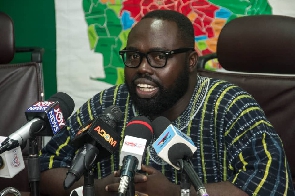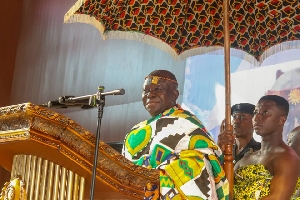General News of Monday, 21 October 2019
Source: kingdomfmonline.com
NDC will arrest fraudsters in PDS deal – Otokunor
The Deputy General Secretary of the National Democratic Congress (NDC), Peter Otokunor, has said his outfit will arrest and punish all persons whose negligence led to the termination of the controversial PDS agreement if voted in power.
According to him, all public and government officials “so connected either directly or remotely to this fraudulent PDS deal be made to suffer all such consequences”.
Speaking in an interview with Kwame Tutu on ‘Anopa Nkomo’ on Accra based Kingdom FM 107.7, Peter Otokunor, said: “This government decided to circumvent a good process with this illegality, inappropriate, and fraud by themselves”.
“Government had to wait for all this while before coming out to say they had done their due diligence… Government has not been fair to the people of Ghana by not sticking to what Parliament had approved and amended it to suit PDS and their personal interest.”
“We believe that the termination of PDS goes beyond the provision of the guarantor…We have information on of alleged people fronting and the agreements we had as challenges and in the coming days, we will come out with the truth.”
Mr. Otokunor said the government has been unfair to Ghanaians by not adhering to earlier concerns raised about the agreement and the NDC will arrest all the people involved in this scandal if we come to power.”
Critics of the agreement have welcomed the termination of the deal over “fundamental and material breaches”.
This comes after the government announced they have finally terminated the concession agreement with PDS, after the detection of fundamental and material breaches of obligation in the provision of Payment Securities.
Background
PDS was the first private company to manage the affairs of ECG after Ghana won the Power Compact II that will inject some $900 million into power distribution.
The decision according to the government was taken following the detection of fundamental and material breaches of PDS’ obligation in the provision of Payment Securities (Demand Guarantees) which was discovered upon “further due diligence.”
“The Demand Guarantees were key prerequisites for the lease of assets on 1st March 2019 to secure the assets that were transferred to the concessionaire,” a statement signed by the Minister of Information, Kojo Oppong Nkrumah stated.
Power Distribution Service (PDS) has denied wrongdoing in its concession agreement with the government through the Ministry of Finance.
In 2014, as part of the conditions that the government needed to satisfy in order to access a second Millennium Challenge Compact, christened the Ghana Power Compact, private participation in the management of Ghana’s debt-ridden energy sector was mooted. The Compact II would see Ghana receive $498.2 million from the Millennium Challenge Corporation of the United States to advance economic growth and reduce poverty in Ghana.
According to the Millennium Development Authority, MiDA, the supervising agency of the MCC Compact, the power compact was to, “directly support the energy sector strategic objectives to achieve power supply sufficiency including exports to neighboring countries, and also supply power for new oil and gas-based industries.”
The John Mahama government announced the decision to, under the Compact II agreement, enter into a concessional agreement where a private company would take over the management of the largest power distributor in the southern part of the country, the Electricity Company of Ghana. The announcement was however met with resistance despite strenuous clarification and explanation by the government that the strategic national asset was being privatized. The workers of ECG held several public fora and protested the decision, arguing that if the government paid its debts to the power distributor and made the necessary investments, the company was capable of paying its supplies and proving viable.











